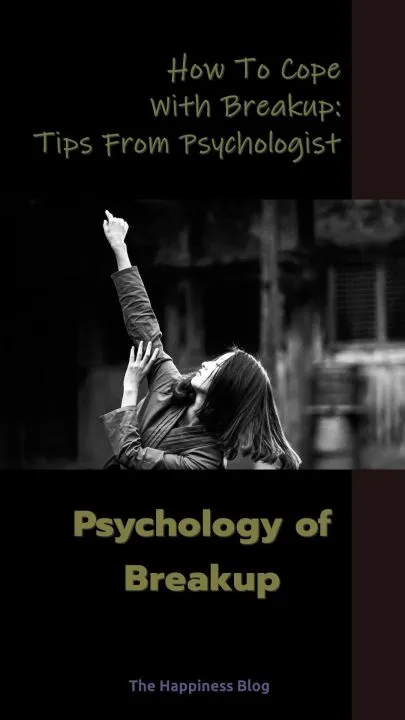Today's Saturday • 7 mins read
— By Dr. Sandip Roy.
Breakups bring up many complex emotions, many of which we cannot even name. But to heal, we have to process them. So, how can breakup-psychology help?
From a psychologist’s point, a breakup can be defined as:
The termination of a special emotional and relational bond between two people, often accompanied by psychological distress and need for emotional adjustment. It marks the end of a romantic relationship, and a disruption (“break”) in attachment, shared goals, and personal identity.
Breakups require us to negotiate grief, loss, and eventual personal growth. The starting point is often to embrace the negative emotions.
Psychologists routinely advise against avoiding our feelings or preventing ourselves from grieving. They say that until we process the breakup emotions—sadness, anger, regret, loneliness, or even relief—the healing doesn’t start.
So, how do you deal with this emotionally difficult challenge?
Coping Tips From Psychology To Deal With A Breakup
- Allow yourself to grieve: You must acknowledge your sad emotions. And give yourself time and permission to grieve the loss of the relationship. You need the time and space to feel sad, angry, or confused.
- Take care of your health: Focus on self-care — things like daily exercise, sleeping well, moving out of your familiar surroundings, can have a great effect on your healing after the breakup. Make sure you eat nutritious meals, exercise regularly, get enough sleep, and avoid harmful substances.
- Seek the company of your loved ones: Visit your friends, family, or others who care about you. Supportive people provide comfort as well as help you process the grief and ease the emotional pain.
- Do some self-reflection: Use this time to reflect on what you learned from the relationship. Identify your patterns of bonding. Note the behaviors (of you and your ex) that pushed the relationship on a downtrend.
- Try some activities you haven’t been doing: Rediscover old hobbies or explore new interests. It’s not just about keeping yourself occupied and distracted, but it’s also about pursuing your purpose in life.
- Break clean with your ex-partner: Make the break clean. Even if you feel (and it will often come as a temptation) to get back in touch, out of plain old habit or hope for reconciliation, do not reconnect. It is necessary for your healing.
- Set little goals for moving forward: Once you grieved through the loss, set some goals. You might want to take a course to improve your career. Dive into some books you have been meaning to read for a long time. Change the way you look, talk, behave. Or try something else to help yourself move into a new reality.

How To Move Forward After A Breakup: Healthy Coping Strategies
- Understand Breakup Psychology
- Recognize that pain is a normal response to a significant loss.
- Be patient and kind to yourself after the breakup.
- Acknowledge Your Emotions
- Allow yourself to feel negative emotions like sadness, anger, grief, and relief without judgment.
- Understand that grieving the loss of a relationship is a natural process.
- Practice Self-Compassion and Self-Care
- Treat yourself kindly, as you would support a close friend in their times of distress.
- Engage in relaxing and enjoyable activities like dancing, exercising, or spending time with loved ones.
- Rebuild Social Connections and Support Networks
- Reach out to old friends or join clubs and interest-based groups. Share your feelings openly; talking about emotions can be cathartic and provide perspective.
- Avoid long periods of isolation, even if you don’t have friends or family to reach out to. Try volunteering and building non-romantics relationships.
- Engage in Personal Growth and Self-Reflection
- Use this time to reconnect with personal goals and values.
- Explore interests or dreams that you put on hold during the relationship.
- Set New Goals and Focus on the Future
- Set small, achievable goals related to career, hobbies, or personal development.
- Shift your focus from losses to potential gains, to foster progress and purpose.
- Enforce the No-Contact Rule With Your Ex
- A no-contact rule helps create space for healing and personal growth.
- Although challenging, non-contact accelerates recovery.
- Integrate the Experience into Personal Growth
- Learn from the relationship and use it as a foundation for a brighter future.
- Whether rekindling love or opening up to new possibilities, focus on self-discovery.
- Embrace Resilience and New Beginnings
- Trust in your capacity for growth and deeper connections.
- Heartbreak offers a chance for profound personal transformation.
- Celebrate Every Little Progress
- Celebrate small milestones as you heal. A solo trip to a nearby city is a win!
- Appreciating progress, no matter how minor, builds motivation and resilience.
- Embrace New Experiences
- Explore new activities and interests that were sidelined during the relationship.
- Trying fresh experiences fosters personal growth and joy.
- Seek Professional Help
- Consult a therapist if you’re struggling with depression, anxiety, or destructive behaviors.
- A professional can offer tools to help you process emotions and rebuild self-worth.
All of us heal at our own pace. There is no right or wrong timeline for recovery from a breakup.
What is important is not neglecting self-care, like exercising, eating healthy, sleeping, washing yourself, wearing clean clothes, and keeping the room tidy.
Further reading:
- Field, T. (2011). Romantic breakups, heartbreak and bereavement—Romantic breakups. Psychology, 2(4), 382-387.
- Fisher, H. E., Brown, L. L., Aron, A., Strong, G., & Mashek, D. (2010). Reward, addiction, and emotion regulation systems associated with rejection in love. Journal of neurophysiology, 104(1), 51-60.
- Slotter, E. B., Gardner, W. L., & Finkel, E. J. (2010). Who am I without you? The influence of romantic breakup on the self-concept. Personality and Social Psychology Bulletin, 36(2), 147-160.
- Tashiro, T. Y., & Frazier, P. (2003). “I’ll never be in a relationship like that again”: Personal growth following romantic relationship breakups. Personal Relationships, 10(1), 113-128.

Understanding The Psychology of Breakups
- 1. Grief and Loss: A breakup often involves a sense of loss, similar to experiencing the passing away of a loved one. The end of a relationship brings feelings of grief, sadness, and emptiness.
- 2. Shock and Denial: Initially, individuals may feel shocked or in denial about the breakup. This stage is characterized by disbelief and difficulty accepting the reality of the situation.
- 3. Anger and Resentment: As reality sets in, anger towards oneself or the ex-partner may arise. Feelings of resentment can stem from perceived betrayal or hurtful actions during the relationship.
- 4. Sadness and Depression: The sadness that follows a breakup can be overwhelming at times, leading to symptoms associated with depression such as low mood, lack of interest in activities, and changes in appetite or sleep patterns.
- 5. Self-Doubt and Insecurity: Breakups often trigger self-doubt and insecurities about one’s worthiness for love or future relationships.
- Attachment styles: Attachment styles play a role in how we handle breakups. A secure attachment style helps us recover faster, as it is built on a strong sense of self-worth that is not heavily tied down on our relationships. Those with an anxious or avoidant attachment style may struggle to recover quickly, often overthinking the loss or suppressing their emotions entirely.
Final Words
Moving forward after a breakup doesn’t mean forgetting the relationship or pretending it didn’t matter.
Rather, it’s about weaving the experience into your life story, learning from it, and using it to build a brighter future.
A healthy way forward is to accept your emotions, letting yourself go through the pain and grief.
Remember, every ending is also a beginning.
√ Also Read: How To Deal With A Breakup Alone (Without Losing Yourself)
√ Please share this with someone.
» You deserve happiness! Choosing therapy could be your best decision.
...
• Disclosure: Buying via our links earns us a small commission.